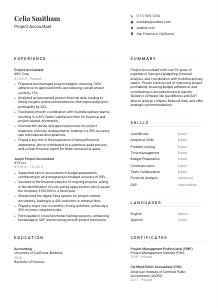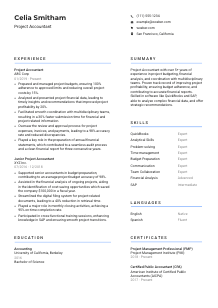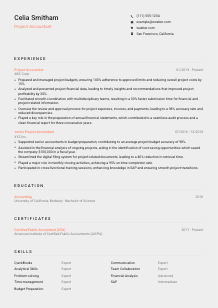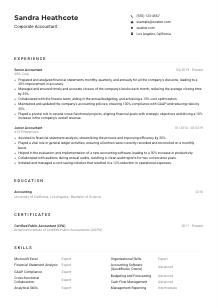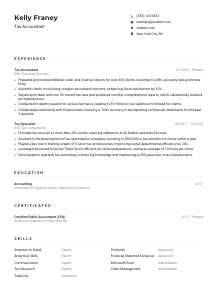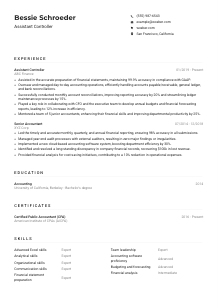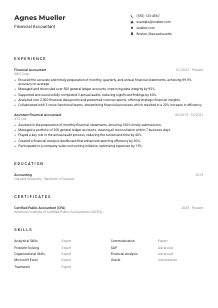Project Accountant Resume Example
Crunching budget numbers, but your resume doesn't add up? Explore this Project Accountant resume example, aligned with Wozber free resume builder. Learn how to showcase your financial finesse in conjunction with project milestones, positioning your accounting career squarely in the black!
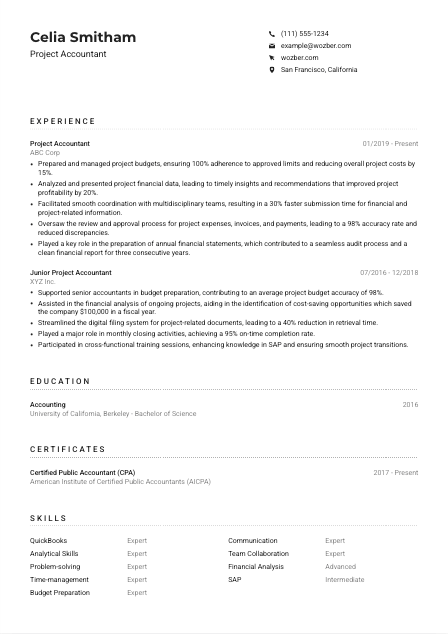
How to write a Project Accountant resume?
So, you've set your sights on that Project Accountant position, and you're ready to dust off your resume and give it a makeover. Well, you've come to the right place! Using the innovative tools provided by Wozber, including our free resume builder and ATS resume scanner, we're going to guide you through tailoring your resume to not just meet but exceed the requirements of your dream job. Every detail, from your personal introduction down to the nitty-gritty of your professional achievements, will be fine-tuned to showcase your financial expertise and project management prowess.
Ready to turn those numbers and project timelines into an offer letter? Let's get started on a journey to craft a resume that sums up your qualifications and outshines the competition.
Personal Details
Think of the Personal Details section of your resume as the entry ledger to your career. It's no average ‘debit and credit' – it's the gateway that introduces you to potential employers. Here's how we tailor this section for the ever-critical eye of a Project Accountant position, ensuring precision and alignment with the San Francisco job market demands.
1. Start with Your Name
Your name isn't just a label; it's your brand. Keep it clean, professional, and let it stand out at the top. This isn't just about choosing a clear, readable font; it's about positioning yourself as the headline of your own career story.
2. Align with the Job Title
Straight under your name, mirror the job title you're eyeing. This isn't repetition; it's strategic positioning. For the Project Accountant, this preempts the ATS and recruiter's glance, ticking a big box in relevance.
3. Include Essential Contact Information
- Phone Number: Your contact number is your direct line. Ensure its accuracy, as this is how potential employers reach out.
- Professional Email Address: Your email should be simple and professional. A combination of first and last name works best, steering clear of whimsical or outdated addresses.
4. Highlight the Required Location
Mention your San Francisco residency upfront. It reassures employers of your availability and alignment with the location-specific requirement, clearing any relocation hurdles from the start.
5. Consider Adding a Professional Profile or Personal Website
If you have a LinkedIn profile, now's the time to ensure it reflects your resume. A well-maintained, professional online presence can reinforce your application, acting as a dynamic extension of your paper resume.
Takeaway
Your Personal Details section balances out who you are with the professional branding you're aiming to project. This isn't just a formal introduction; it's a strategic alignment with the Project Accountant role you're pursuing. Remember, clarity and relevance set the tone for the rest of your resume. You're not just listing details; you're opening the ledger to your career.





Experience
Your experience section is the profit and loss statement of your resume, showcasing your financial and project management acumen. It's where you get to illustrate your career story through the lens of fiscal responsibility and strategic project oversight. Let's break down how to ensure this section aligns perfectly with the Project Accountant position's requirements, using precision and clear-cut figures to highlight your professional journey.
- Prepared and managed project budgets, ensuring 100% adherence to approved limits and reducing overall project costs by 15%.
- Analyzed and presented project financial data, leading to timely insights and recommendations that improved project profitability by 20%.
- Facilitated smooth coordination with multidisciplinary teams, resulting in a 30% faster submission time for financial and project‑related information.
- Oversaw the review and approval process for project expenses, invoices, and payments, leading to a 98% accuracy rate and reduced discrepancies.
- Played a key role in the preparation of annual financial statements, which contributed to a seamless audit process and a clean financial report for three consecutive years.
- Supported senior accountants in budget preparation, contributing to an average project budget accuracy of 98%.
- Assisted in the financial analysis of ongoing projects, aiding in the identification of cost‑saving opportunities which saved the company $100,000 in a fiscal year.
- Streamlined the digital filing system for project‑related documents, leading to a 40% reduction in retrieval time.
- Played a major role in monthly closing activities, achieving a 95% on‑time completion rate.
- Participated in cross‑functional training sessions, enhancing knowledge in SAP and ensuring smooth project transitions.
1. Break Down the Job Requirements
Start with a ledger in mind, balancing your career experiences against the job requirements. For a Project Accountant, skills in budgeting, financial analysis, and software proficiency are key. Highlight these areas in your previous roles, ensuring a match that resonates with the posting.
2. Structure with Roles and Companies
Organize your previous positions clearly, starting with the most recent. Your value as a candidate is compounded by your progress and the reputations of companies you've worked with. Much like a balance sheet, this gives a snapshot of your career's health.
3. Craft Targeted Accomplishment Statements
Turn each role into a statement of your accomplishments. For instance, detailing how you managed project budgets or streamlined financial reporting processes, akin to ledger entries that highlight your knack for optimization and precision.
4. Quantify Achievements When Possible
Numbers speak loudly in Project Accounting. Quantify your achievements, like by how much you reduced project costs or improved profitability. This is the evidence of your impact, the tangible profits in your career's profit and loss statement.
5. Keep It Relevant
Ensure every job listed has a direct correlation to the Project Accountant role. Irrelevant positions are like inaccuracies in a financial statement — they detract from the overall picture and can lead to questions about your focus and specialization.
Takeaway
Your experience section is where you consolidate your value, much like closing the books at the end of a fiscal period. It's about proving, through clear examples, how your professional journey has prepared you for the Project Accountant role. By aligning your experiences with the job requirements and quantifying your impact, you make a compelling case for your candidacy. Keep it relevant, clear, and always in line with the role's demands.
Education
The Education section of your resume can be likened to a Balance Sheet, offering a snapshot of your academic foundations and intellectual assets. For a Project Accountant position, the strength of your educational background in accounting, finance, or a related field cannot be overstated. Let's examine how to present these qualifications in a way that reflects both your readiness and your commitment to the field.
1. Pinpoint the Key Educational Requirement
Start by aligning your academic credentials with the job's educational requirements. For this role, a Bachelor's degree in Accounting or Finance is key. Ensuring this alignment is clear on your resume establishes a foundation of relevance and qualification.
2. Structure with Simplicity
List your qualifications straightforwardly: degree title, field of study, institution, and graduation year. This clarity mirrors the transparency needed in financial reporting and underscores your adherence to professional standards.
3. Tailor Your Degree Details
Specificity is your friend. As a Project Accountant candidate, emphasizing a degree in Accounting over a more general Finance degree (if applicable) can add an extra layer of suitability for the role, much like specifying assets over liabilities in a balance sheet adds clarity to financial health.
4. Highlight Relevant Courses (if needed)
Especially for roles demanding specific skills, highlighting relevant coursework can further assert your readiness. For example, 'Advanced Project Accounting Techniques' or 'Financial Software Applications' can catch an employer's eye.
5. Consider Other Educational Achievements
Honors, relevant extracurricular activities, or significant projects can serve as endorsements of your commitment and ability. However, weigh their inclusion against the role's level — they're more impactful at the entry-level than for seasoned professionals.
Takeaway
Your education section provides a debits and credits overview of your academic foundation. It should reassure the employer of your qualifications and preparedness for the role of a Project Accountant. Like a balance sheet, it balances your educational liabilities (what you've needed to learn) against your intellectual assets (what you've mastered). Craft this section to reflect the strength of your academic background, relevant to the requisites of the role you're aspiring to.
Certificates
In the world of accounting and project management, certificates are like your portfolio's financial indicators — they signal your continuous learning, expertise, and specialization. Particularly for a Project Accountant, certain certifications can elevate your candidacy. Let's chart a course through selecting and presenting these certifications to reflect the depth of your expertise and your commitment to professional growth.
1. Extract Key Job Requirements
First, note the preferred certifications for your target role. The Project Accountant position values CPA or PMP — these are significant indicators of your specialized knowledge and commitment to your profession.
2. Pick Certificates that Resonate
Choose to list certificates that resonate most closely with the role's demands. A narrow focus on relevant certifications like CPA or PMP demonstrates your specialization, akin to showcasing profitable investments in your portfolio.
3. Be Transparent with Dates (if relevant)
Just as financial indicators have time frames, so too should your certifications. If recent or particularly relevant, include the acquisition dates to highlight your current expertise and ongoing commitment to professional development.
4. Stay Updated
The financial landscape and project management methodologies evolve; your certifications should too. Pursue continuous learning and renewal of key certifications. This sustained commitment is a strong indicator of your dedication to excellence in your field.
Takeaway
Your certifications are not mere accolades but testaments to your ongoing professional education. They signal your readiness and adaptability in a changing field, much like financial indicators forecast economic trends. Highlight your most relevant certifications, keep them current, and let them serve as beacons of your expertise and commitment to the Project Accountant role.
Skills
The Skills section is the assets column of your resume, showcasing the tools, methodologies, and competencies you bring to the Project Accountant table. This is where you quantify your professional toolkit, aligning it with the specific needs of the job you're targeting. Let's break down how to curate this list to reflect your fit for the role, ensuring that each skill declared adds value and relevance.
1. Decode the Job Requirements
Evaluate the job description to understand the hard and soft skills they're seeking. For instance, if 'proficiency in accounting software' is mentioned, ensure your skills in QuickBooks or SAP are front and center.
2. List Skills that Directly Align
Detail both technical skills and soft skills that match the position's requirements. As a Project Accountant, emphasize your expertise in budgeting, financial analysis, and software, but don't overlook the importance of time management and communication.
3. Keep It Neat and Organized
A cluttered skills section is like an overcomplicated spreadsheet — hard to decipher. List your skills clearly and concisely, ensuring each one is directly relevant to the Project Accountant role. This is about showcasing your most significant assets, not listing every skill you possess.
Takeaway
Just as assets contribute to the profitability of a business, your skills contribute to your effectiveness as a Project Accountant. This section is an opportunity to underscore the valuable assets you bring to the role. Select and present your skills with care, ensuring they align with the requirements and expectations of the job. Your professional toolkit should reflect not only your expertise but also your readiness to excel in the Project Accountant position.
Languages
In the diversifying world of finance and project management, the ability to communicate across languages can significantly enhance your portfolio. For a Project Accountant role, especially one that may interact with international clients or teams, linguistic skills can be a notable asset. Here's how to highlight your multilingual capabilities in a way that adds value and opens doors to global opportunities.
1. Review the Job Requirements
Assess if the job posting specifies any language requirements or preferences. While English proficiency is a mandate, additional languages could mark you as a candidate of choice, especially in roles with a global outlook.
2. Highlight Essential Languages
List languages critical to the job first, specifying your proficiency. For the Project Accountant role, prioritize English but also consider the strategic value of including others like Spanish, if fluent.
3. List Other Languages You Know
Beyond the essential, additional language skills can showcase your adaptability and global perspective. Don't hesitate to list these, as they can make your resume stand out in a crowded field.
4. Be Honest About Your Proficiency
- Native: A language you've effortlessly mastered from birth.
- Fluent: You can effortlessly communicate, understand, and navigate in the language.
- Intermediate: You're comfortable in a variety of situations but might struggle with complex topics.
- Basic: You understand and can use foundational phrases for travel or basic conversations.
5. Understand the Role's Scope
For positions with an international focus or in multinational companies, languages are a definitive asset. Assess the scope of the Project Accountant role to determine the strategic value of including multiple languages on your resume.
Takeaway
Your ability to communicate across languages is a unique asset in the global marketplace. It not only enriches your professional portfolio but also opens doors to diverse opportunities and connections. Treat your linguistic skills as integral tools in your Project Accountant toolkit, showcasing them as bridges to broader horizons and richer professional interactions. Keep learning, keep talking, and let your languages pave the way to new adventures in your career.
Summary
Your resume's Summary section is akin to an executive report for your candidacy — concise, impactful, and summarizing why you're the perfect fit for the Project Accountant role. This is where you weave together your skills, experience, and unique professional value, crafting a compelling overview that commands attention. Let's craft a summary that encapsulates your qualifications and distinctiveness for this specialized role.
1. Understand the Essence of the Job
Begin by absorbing the core requirements of the Project Accountant position. Reflect on how your personal brand and professional journey align with these needs, setting the stage for a tailored and impactful summary.
2. Begin with an Introduction
Introduce yourself as a seasoned Project Accountant, summarizing years of experience and your specialty areas. This sets the tone, establishing you as a confident and capable candidate.
3. Address Key Job Requirements
Highlight the specific skills and experiences that directly respond to the job description. For instance, emphasize your proficiency in QuickBooks and SAP, your track record in improving project profitability, and your expertise in financial analysis and strategic recommendations.
4. Keep It Concise
This isn't the place for detailed stories. Instead, succinctly encapsulate your qualifications and what sets you apart as a Project Accountant candidate. Think of this as your resume's 'hook' — what will make the hiring manager want to dive deeper into your resume.
Takeaway
Just as an executive report distills essential information, your resume summary encapsulates your unique value proposition as a Project Accountant candidate. By carefully tailoring this section to the role's requirements, you not only state your case but also set the tone for the detailed narrative that follows in your resume. Remember, this is your opening statement in what you hope will be a successful transaction — landing that dream job. Make it count, and leave the hiring manager eager to learn more about you.
Navigating Towards Your Project Accountant Role
Congratulations on taking this deep dive into the art of crafting a resume tailored for the Project Accountant position. Armed with insights from Wozber, including our ATS-friendly resume templates and ATS resume scanner, you're now equipped to assemble a resume that speaks directly to the needs of your target role. Remember, every detail matters — from the precision of your personal details to the strategic layout of your skills and certifications. Your resume is more than a document; it's a narrative of your professional journey and a blueprint of your potential.
As you refine each section, imagine it as a line in your ledger, contributing to the final balance — a successful hiring outcome. Now, go forth, polish your resume, and step confidently towards your next career milestone. The world of Project Accounting awaits your expertise.

- Bachelor's degree in Accounting, Finance, or a related field.
- Minimum of 3 years of project accounting or financial analysis experience.
- Proficiency in using accounting software, such as QuickBooks or SAP.
- Strong analytical, problem-solving, and time-management skills.
- Certified Public Accountant (CPA) or Project Management Professional (PMP) certification is a plus.
- English language skills are mandatory for this position.
- Must be located in San Francisco, California.
- Prepare project budgets and monitor costs to ensure projects are completed within the approved budget.
- Analyze project financial data, provide regular reports, and make recommendations for improved project profitability.
- Coordinate with multidisciplinary teams to ensure accurate and timely submission of financial and project-related information.
- Review and approve project expenses, invoices, and payments ensuring adherence to company policies.
- Assist in the preparation of annual financial statements and project audit support.





